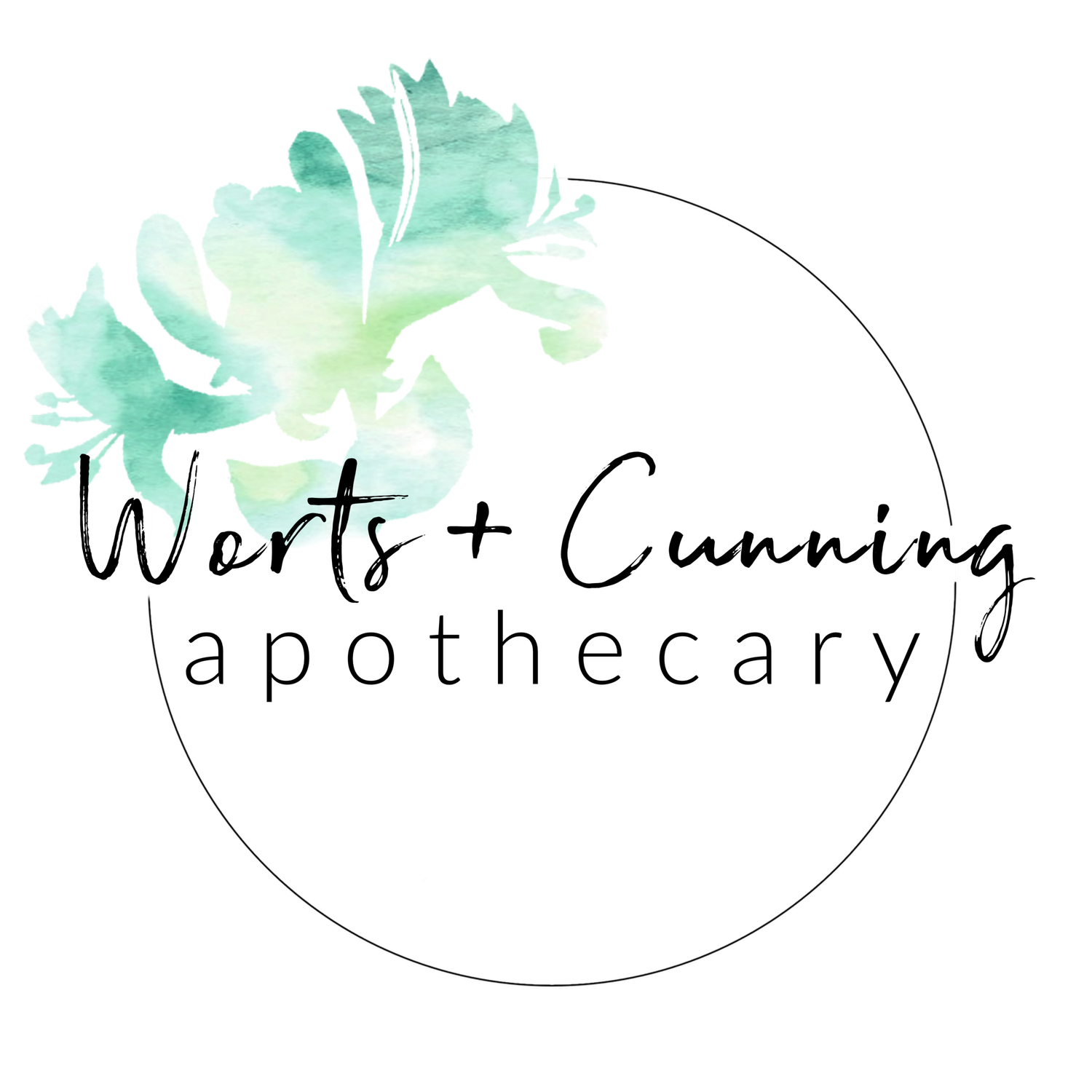The Plant Allies of Winter: Creating A Winter Wellness Apothecary
The sniffles. The 'flu. The cranky tummy. The hacking cough.
All travel around quicker than a skittish reindeer during the winter and while many of us might want to turn to herbal remedies for some help, it can be hard to know what herb to choose - especially when you're feeling under the weather.
With a bit of preparation, you can create an easy-to-use winter apothecary for common seasonal complaints. It all begins by getting to know your winter plant allies and selecting a few that you become comfortable working with. One herb often serves many needs (because plants are galaxies of healing, blessed be!) and you don't need to know a hundred herbs, but just a handful, to help you keep well during the winter. Each herb listed below is in at least two categories if not more to help you find a few herbs that will work for a multitude of complaints. I have not created an extensive, never-ending list of herbs for each common winter ailment listed below because I am hoping to encourage focused simplicity in your practice. However, you might already use an herb for one or more of the categories below that is not listed and you are very much encouraged to incorporate it into your list of indispensable winter herbs.
Since Creating A Winter Apothecary is part of the free Plant Ally Project series (check out the Thirty Day Challenge for a more in-depth herbal experience), I'm going to offer suggestions for herbs that you might check out but it's up to you to meet the plants and build a custom winter apothecary for you and your loved ones.
Subscribers to my Magick Mail get a free worksheet and quick guide to organize their winter apothecary and easily reference what herb they might need for whatever winter illness issue that might arise.
Creating Your Winter Apothecary
Begin by reading through the list of herbs below in each of the ten categories. I've listed when I've written about each herb, but you can also start with my Winter Wellness: Healing Herbs for the Dark of the Year which profiles some herbs on this list.
After doing some research, choose one herb from each category. You might end up with 10 different herbs to work with, but most likely you'll have less since each herb can be found in more than one category.
Learn about the best way to prepare your herb as a remedy. I've listed common remedy preparations in my Plant Ally Project Thirty Day Challenge. If you're looking for more in-depth and diverse herbal remedy tutorials check out the Lunar Apothecary.
Gather together your chosen herbs and have them in an easy to access space in your home. I encourage you to add labels to their containers (whether a loose herb jar or a tincture bottle) that indicates what the herb can be used for as well as dosage. You might have a jar of Sage (Salvia officinalis) and label it with the following description: "Good for wet coughs + excess phlegm, congestion, sore throats, and indigestion. Dosage is 1 teaspoon per cup of water."
Create your own Winer Apothecary "cheat sheet" with my free worksheet and quick guide available to my Magick Mail subscribers.
Herbs for Preventative Care or Daily Tonics
Let's start with some daily winter tonics which are nutritive, generally warming, and often immunomodulating (as opposed to immunostimulating - which we'll look at later). These are herbs that can be taken on a daily basis throughout the winter.
Elder (Sambucus nigra): Read more about Elder in my Tree of Medicine and Winter Wellness post.
Ginger (Zingiber officinale): Read more about Ginger in my Aries Astroherbology Profile.
Milky Oats (Avena sativa)
Sacred Basil or Tulsi (Ocimum sanctum)
Herbs for Dry + Hacking Coughs
Moistening or mucilaginous herbs are of great help when the respiratory tract is dry and irritated. Many of these herbs have additional nervine qualities which help to relax the tension brought on by irritation.
Angelica (Angelica archangelica): Read about Angelica in my To Ignite the Imagination post.
Herbs for Wet Coughs + Excess Phlegm
Herbs that are astringent can be excellent allies in drying up excess damp and phlegm in the system. They help to tone, tighten, and restore tissues to their optimal state, preventing or helping the body to recover from infection or prevent it from settling in the body.
Rosemary (Rosmarinus officinalis)
Sacred Basil or Tulsi (Ocimum sanctum)
Yerba Mansa (Anemopsis californica)
Herbs for Sore Throats
Similar to herb for dry and hacking coughs, herbs for sore throats are generally moistening in nature. Some are more drying and others are more moistening while others are neutral in temperature. Many are also anodyne in nature, meaning that they offer pain relief, which is an added bonus when dealing with the discomfort of sore throats.
Angelica (Angelica archangelica): Read about Angelica in my To Ignite the Imagination post.
Cleavers (Galium alparine): Especially useful when the lymph glands are swollen.
Yerba Mansa (Anemopsis californica)
Herbs for Drippy Noses
Herbs that are warming, astringent, and tonifying to the mucus membranes can help take care of the drippiness of an unhappy nose.
Ginger (Zingiber officinale): Read more about Ginger in my Aries Astroherbology Profile.
Yerba Mansa (Anemopsis californica): Yerba Mansa is a tophorestorative for the mucus membranes which is why it is great for both drippy and congested noses.
Herbs for Congested Noses
Herbal expectorants help the body cough, sneeze, and release excess mucus, clearing out congestion and helping us breath clearly again. Pay attention to the color of your mucus. Yellow mucus indicates heat (think of sunny warm yellow) and more cooling expectorant herbs are useful while clear or white mucus indicates cold (think of snowy cold white) and warming expectorant herbs are a better choice.
Ginger (Zingiber officinale): Read more about Ginger in my Aries Astroherbology Profile.
Peppermint (Mentha piperita): Read more about Peppermint in our Winter Wellness and Quicken the Mind.
Sacred Basil or Tulsi (Ocimum sanctum)
Yerba Mansa (Anemopsis californica)
Herbs to Cleanse the Lymphatic System
Our hard-working lymphatic system can get clogged down leading to uncomfortably swollen glands that can't properly process blood and fluid which means white blood cells are transferred less effectively throughout the body. Adding lymphatic cleansers to cold care blends can be very helpful in promoting a speedy recovery or preventing a virus from settling in the body in the first place.
Cleavers (Galium alparine)
Yarrow (Achillea millefolium)
Herbs to Stimulate the Immune System
The following herbs are known as immunostimulators meaning that they stimulate the immune system into action and are best used for a the short run when you're dealing with a cold or 'flu or in a higher risk situation for exposure (such as air travel or hanging around kindergarteners).
Echinacea (Echinacea purpurea)
Elder (Sambucus nigra): Some folks categorize Elder as immunostimulating as well as immunomodulating. What Elder does is disrupts a viruses' ability to replicate and while that does stimulate the immune system into action, I have not found Elder to be more useful as tonic than a short-term herb for acute symptoms (though it still is effective in the short term because it's a pretty darn amazing plant). Read more about Elder in my Tree of Medicine and Winter Wellness post.
Yerba Mansa (Anemopsis californica)
Herbs for Fever + Achiness
Fevers help our bodies to burn off infection and as long as they stay within a safe range (when a fever in an adult is consistently 103° or higher and lasts for three days or more it is time to seek medical help). Yet, fevers can come with accompanying discomfort including aches and pains which may be relieved by the herbal remedies listed below.
Boneset (Eupatorium perfoliatum): Especially useful for when the bones feel achy otherwise known as "break-bone fever."
Echinacea (Echinacea purpurea)
Elder Berry (Sambucus nigra): Read more about Elder in my Tree of Medicine and Winter Wellness post.
Elder Flower (Sambucus nigra): When restlessness and irritability is present. An Elder Flower foot bath can be helpful for those who are having difficulty sleeping. Read more about Elder in my Tree of Medicine and Winter Wellness post.
Elecampane (Inula helenium): Read more about Elecampane on my Winter Wellness post.
Ginger (Zingiber officinale): Read more about Ginger in my Aries Astroherbology Profile.
Milky Oat (Avena sativa): While not an herb specific to fever it can be very useful in recovering from a fever when there are signs of adrenal burnout, fatigue or if the illness has been brought on, in part, because of not allowing oneself to take time grieve a loss.
Sacred Basil or Tulsi (Ocimum sanctum)
Vervain (Verbena officinalis): For type 'A's who don't know when to stop and need to relax in order to heal.
Yarrow (Achillea millefolium)
Herbs for Indigestion
Whether indigestion that has come with the 'flu or from a sluggish system burdened by too many rich winter foods, the following herbs, many of which are considered digestive bitters, can help to improve intestinal tone, relieve gas and cramping, and help to rekindle the digestive fires.
Calendula (Calendula officinalis): Especially good for inflammation along the intestinal tract as well as stomach ulcers.
Ginger (Zingiber officinale): Read more about Ginger in my Aries Astroherbology Profile.
Rosemary (Rosmarinus officinalis)
Sacred Basil or Tulsi (Ocimum sanctum)
Yarrow (Achillea millefolium)
🌿
I hope you're feeling inspired to create your own Winter Wellness Apothecary! I’ve created guides for all of the seasons to help support your herbal year:
May your winter be full of joy and beautiful connections, with plants, people, and the magick of the ending year.






